WEP, DOLE hold Paralegal Training Program on Labor Rights and Remedies
The University of the Philippines (UP) Law Center (UPLC) Workers and Employees Program (WEP), in collaboration with the Department of Labor and Employment (DOLE), conducted the first Paralegal Training Program on Labor Rights and Remedies last 11-12 and 17-20 April 2024. Thirty-nine (39) representatives from various unions, federations, and other labor organizations took part in the training.
The paralegal training program was conducted pursuant to the Memorandum of Agreement (MOA) entered into by the UP College of Law, the UP Law Center, and the DOLE last 22 August 2023. Under the MOA, the DOLE, the UP Law Center and the UP College of Law, through the WEP, shall jointly develop and implement a gender-sensitive paralegal training program for workers that would capacitate them on various legal remedies available to them, as well as on case build-up, so that they can help in providing relevant information and/or evidence towards establishing an airtight case against perpetrators of violence committed against their ranks. The paralegal training program covers the following topics:
- Overview of labor laws and regulations, including the International Labour Organization (ILO) Conventions, and their application to workers’ rights and welfare;
- Understanding of the legal process and procedures, including the filing of complaints and cases before the appropriate courts and administrative bodies;
- Case build-up and legal research, including the gathering of relevant information and evidence to support workers’ claims; and
- Legal remedies and options available to workers in case of violations of their rights, including the filing of complaints, grievances, and appeals before the appropriate legal and administrative bodies;
Two more rounds of the training are expected to be held under the MOA before the end of this year.
The first five days of the April 2024 training were held at Bocobo Hall, UP Law Complex, Diliman, Quezon City. The last day was held at the Ichikawa Hall of the DOLE Occupational Safety and Health Center (OSHC) at North Avenue, Quezon City.
DOLE Undersecretary Hon. Benedicto Ernesto R. Bitonio, Jr. graced the opening day of the training program. He provided an introduction and context of the training.
WEP Founding Program Director Professor Patricia R.P. Salvador Daway likewise welcomed the participants to the training program. She introduced the Workers and Employees Program, its history, vision and mission, and activities.
Day 1: 11 April 2024
WEP Program Director Attorney Arnold F. de Vera discussed the fundamental principles under international law and under the Philippine Constitution. The discussion also provided an introductory overview of the Philippine legal system, the concept of management prerogative, and the different international human rights instruments, such as the Universal Declaration of Human Rights (UDHR), the International Covenant on Civil and Political Rights (ICCPR), and the International Covenant on Economic, Social and Cultural Rights (ICESCR).
WEP Junior Legal Associate Attorney Jasper Frederick C. Briones proceeded with a lecture on the Rights and Obligations of Workers. He provided an overview of fundamental ILO Conventions that the Philippines has ratified, explained how these interacted with Philippine law, and reiterated the cardinal rights accorded to labor under the Philippine Constitution. He also explained how the State’s policy of according full protection to labor is implemented through the rights recognized by, as well as the duties and obligations imposed under, the Labor Code of the Philippines.
Professor Nathalie Africa-Verceles of the Department of Women and Development Studies (DWDS), College of Social Work and Community Development (CSWCD), UP Diliman, started the afternoon session with a lecture on Examining Gender. She talked about Sexual Orientation, Gender Identity and Expression, and Sex Characteristics (SOGIESC), Hegemonic Masculinity, Patriarchy, and Violence Against Women, Sexism and Misogyny, Feminism, Gender and Development, and Gender Mainstreaming.
Attorney Hendrix Bongalon of the UP Law Center Gender Law and Policy Program (GLPP) concluded day 1 with the discussion on Anti-Sexual Harassment and Safe Spaces in the Workplace. The lecture focused on identifying the legal remedies provided for the acts prohibited by, and the duties and liabilities of employers and educational institutions under, the Anti-Sexual Harassment Act and the Safe Spaces Act.
Day 2: 12 April 2024
The first two lectures for the second day of the paralegal training program both focused on gender.
Attorney Glenda Litong, GLPP member, head of the Training and Convention Division (TCD) of the UP Law Center, and Law Reform Specialist V of the UPLC Institute of Human Rights, lectured on Gender-fair Language. She emphasized how gender-fair language should be used in the workplace to promote inclusivity, foster healthy working environments, maintenance of respect with regards diversity, and removal of stereotypes.
Associate Professor Leo Battad, GLPP Program Director and also a WEP member, covered Gender-based Collective Bargaining. She lectured on gender discrimination, gender equality, the United Nations Convention on the Elimination of All Forms of Discrimination against Women. She then proceeded to identify the gains and gaps that Philippines currently have in law with regards to gender equality. Her talk culminated with discussing how Collective Bargaining Agreements are a means to promoting gender equality in the workplace.
WEP Senior Legal Associate Attorney Emir-Deogene V. Mendoza gave an overview of the legal system in the Philippines, focusing on rudimentary concepts such as the hierarchy of laws and courts, jurisdiction and venue, and the remedies that may be resorted to for violations of rights. Attorney Mendoza then lectured on exhaustion of administrative and domestic remedies, before describing the remedies under international law.
Attorney Juan Carlo Tejano of SALIGAN concluded with his activity and lecture focused on jurisdiction and remedies in Philippine Labor Law. He focused on clarifying the proper government agency or official that a laborer may proceed to in case any of their rights under the Labor Code are violated.
Day 3: 17 April 2024
The third day of the paralegal training program focused on violations of rights as crimes and available legal remedies under criminal law, as well as special writs and access to legal assistance.
Attorney Dan Calica of the UP College of Law faculty lectured on the principles of criminal law and on select crimes under the Revised Penal Code and special laws, particularly the Anti-Torture Act, the Anti-Enforced or Involuntary Disappearance Act, and those crimes relating to violations of labor rights. He identified and distinguished the different crimes, enumerated their constitutive elements, and noted that these offenses under the general criminal law may be applied to labor.
Thereafter, Attorney Niel Anthony S. Borja, also from the UP College of Law faculty, described the laws and rules on the conduct of arrests, searches, seizures, and detention of individuals. Premised on the right against unreasonable searches and seizures under the Constitution,he distinguished the requisites and limitations of warrant and warrantless searches and arrests, as well as explained how the rights of the accused should be protected in such undertakings. Attorney Borja also identified the remedies for violations of rights in these cases.
Finally, Chief of Staff to the Dean Attorney Marwil N. Llasos, also UP College of Law Office of Legal Aid (OLA) Deputy Director and WEP member, identified and explained the scope and limitations of the special writs of amparo, habeas corpus, and habeas data in stopping and deterring further violations of rights. He also shed some light on the significance of access by the public to legal assistance, including organizations that provide legal assistance, such as the Integrated Bar of the Philippines (IBP) and the Public Attorney’s Office (PAO).
Day 4: 18 April 2024
Attorney Mendoza of WEP expounded on Republic Act No. 11749, or the Anti-Terrorism Act of 2020 (ATA), its Implementing Rules and Regulations, the Supreme Court (SC) December 2021 decision on Calleja vs. Executive Secretary, and the Rules on the ATA and Related Laws promulgated by the SC. He clarified the legal definition of the term “terrorism” as well as the other punishable crimes. He further outlined the processes of designation, proscription, authorization for surveillance, hold departure orders, warrantless arrests and extension of period of detention under the ATA.
Thereafter, WEP Program Director Attorney de Vera delineated the Guidelines on the Conduct of the DOLE, DND, DOJ, AFP, and PNP relative to the Exercise of Workers’ Rights and Activities vis-a-vis the Joint DOLE-PNP-PEZA Guidelines in the Conduct of Personnel during Labor Disputes. He emphasized the need for respect for workers’ rights during internal peace and security operations done by the AFP and PNP. He also presented the various remedies for violations according to the Guidelines.
Attorney Litong of UPLC concluded the fourth day with a thorough discussion of the Jurisdiction and Remedies in Civil Law and Jurisprudence relative to Human Relations for Workers and Trade Union Leaders. She lectured on the Civil Code articles pertaining to the Law on Human Relations, particularly Articles 19 to 23, as well as other provisions corresponding to the same, while emphasizing that civil remedies are available under the Law on Damages. Attorney Litong illustrated the kinds of remedies and reparations feasible for recovery of damages.
Day 5: 19 April 2024
Attorney Briones of WEP gave an overview of the rules on evidence based on the Constitution, laws, the 2019 Amendments to the 1989 Revised Rules on Evidence, and related Supreme Court issuances. He discussed the nature and importance of evidence, the need to safeguard evidence and important principles, such as admissibility of evidence, relevance, and competence, as well as the different kinds of evidence: object, documentary, and testimonial. The lecture provided an overview of some of the rules of admissibility, the burden of proof, burden of evidence, and presumptions. He described how presentation and offer of evidence are made and the various weight and sufficiency of evidence necessary depending on the nature of the case.
Attorney Arnel Abeleda of the Free Legal Assistance Group (FLAG) lectured on Conducting Investigations and Interviews. He explained the various challenges an interviewee faces and the necessary skills that an interviewer must have to properly obtain relevant and meaningful information, including those being expressly said by the interviewee and those comprising non-verbal languages. He emphasized specific soft skills that an interviewer should acquire, such as building rapport, to be able to interact well with the interviewee, especially when dealing with sensitive matters or information.
Finally, Attorney Maria Carmela Maranan, also of the FLAG, lectured on, and facilitated an activity to demonstrate, the proper Documentation of Cases, Report Writing, and Affidavit Making. She discussed in detail the purposes of preparing a report and its contents and the basic contents of an affidavit, as well as the steps for their preparation. After the lecture, the participants were asked to prepare their own Ulat or Sinumpaang Salaysay and presented their output to everyone.
Day 6: 20 April 2024
On the last day of the training program, the participants applied the knowledge from the past five days on their presentations of the case studies assigned to them by DOLE. This was followed by the closing ceremony.
UP College of Law Dean Darlene Marie B. Berberabe thanked the participants, resource persons, WEP and DOLE for the conduct of the first training. She stressed the aim of informing workers and giving them skills to face threats to human and workers’ rights.
DOLE Secretary Bienvenido E. Laguesma highlighted the Department’s commitment to empowering workers’ organizations towards promoting industrial peace. Further, DOLE Undersecretary Benedicto Ernesto R. Bitonio, Jr. hoped to see the continuous implementation of the training program.
According to WEP Program Director Attorney Arnold F. De Vera, the goal is to see the faithfulness the law promises—to realize equality and balance for labor workers and employees—and to step up to meet the challenges of the time.

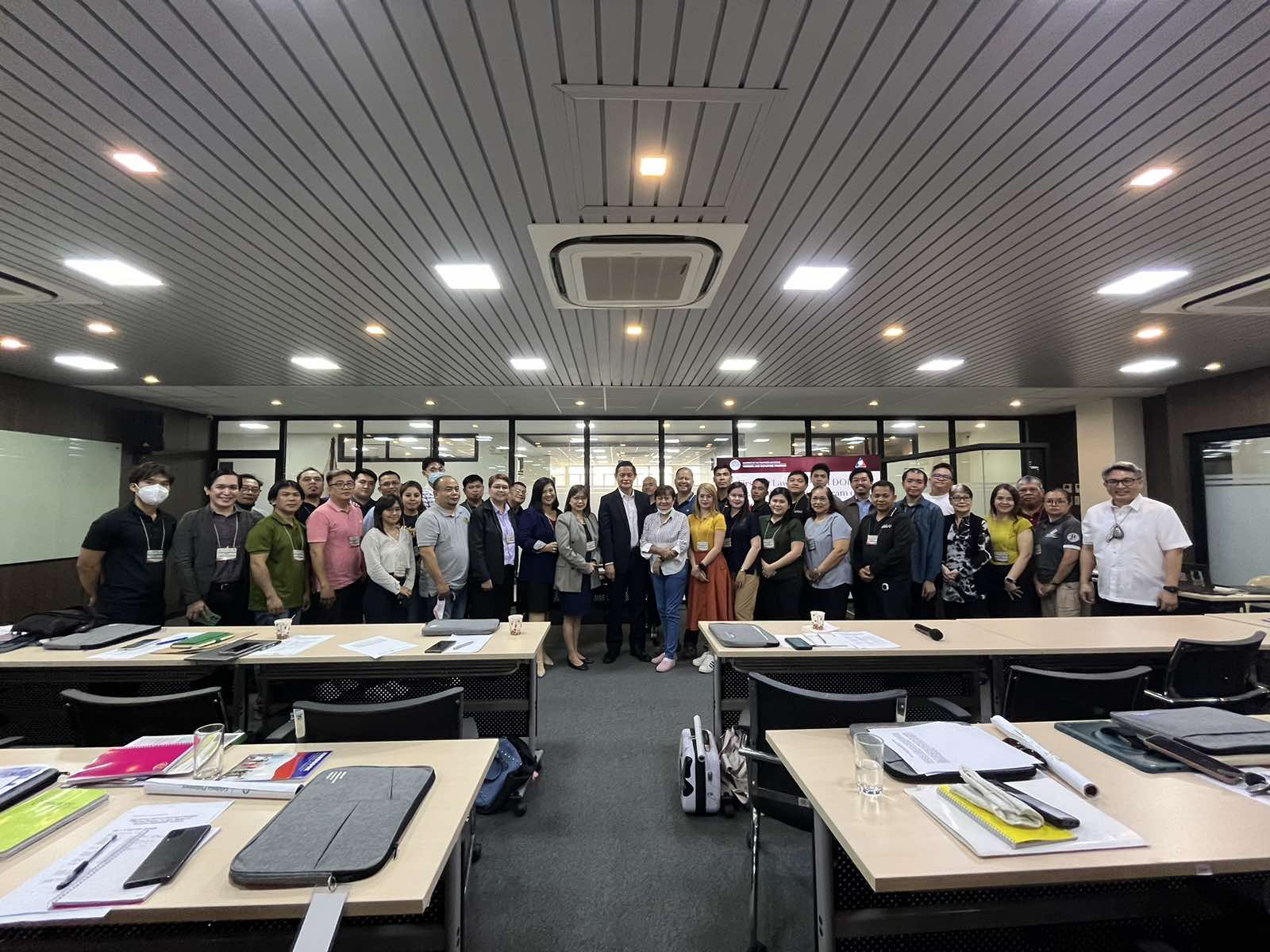
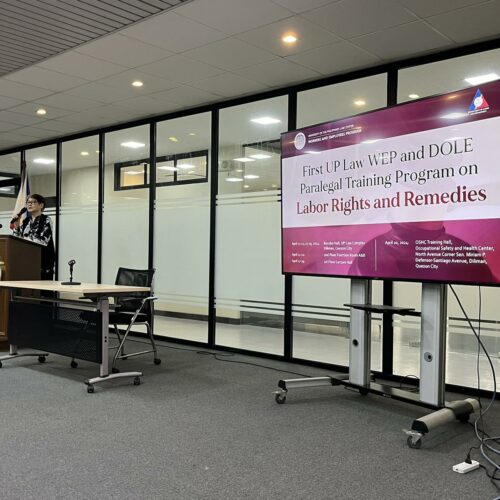
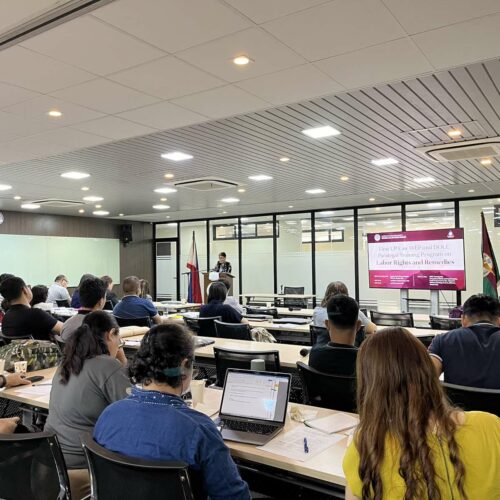
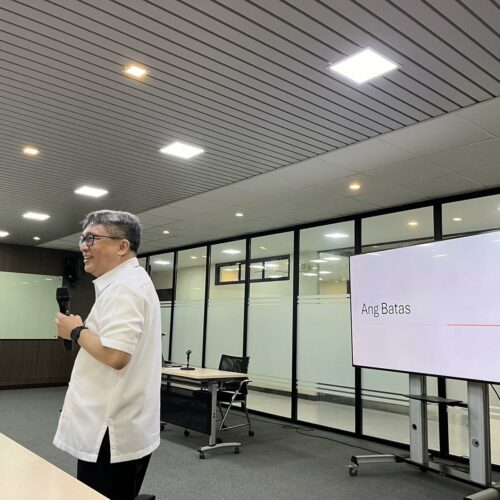
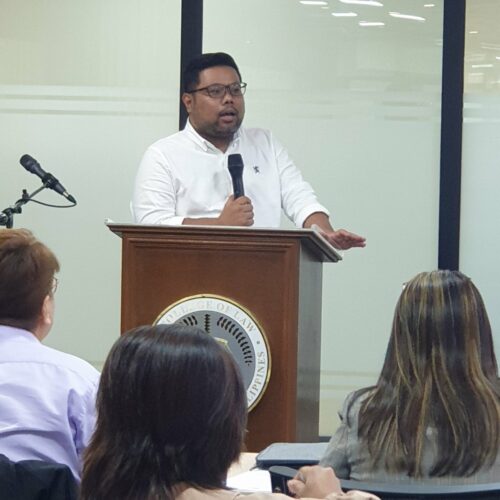
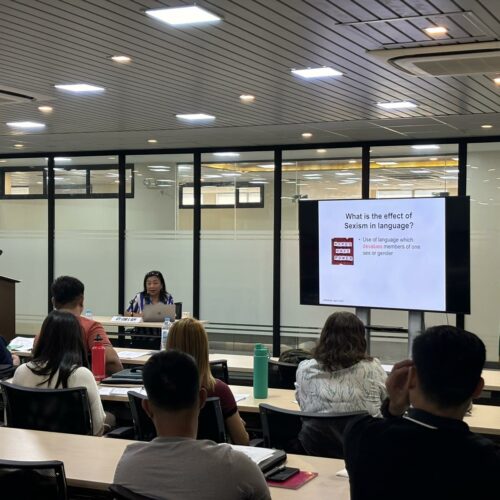
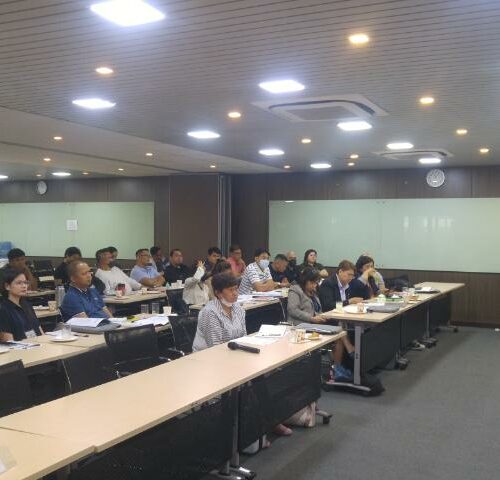
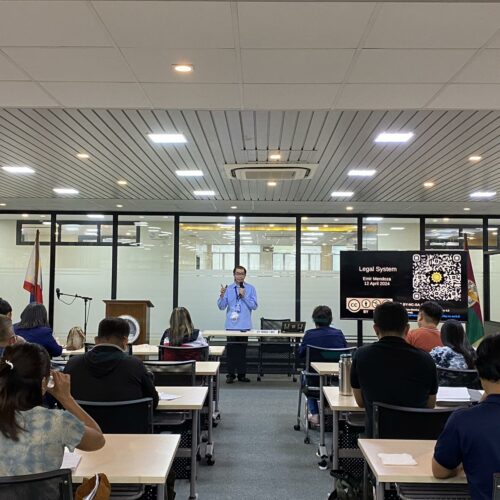
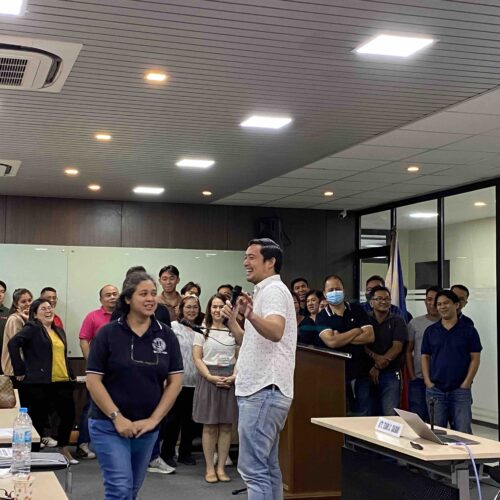
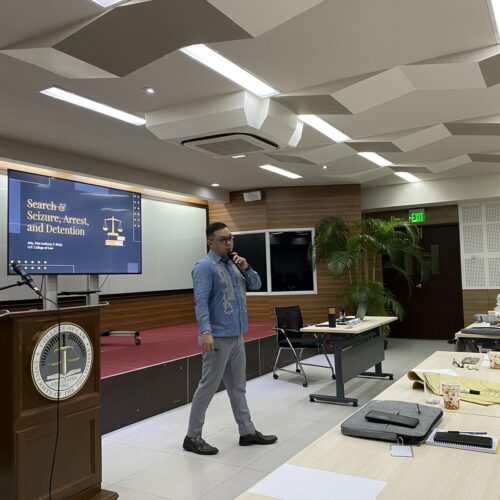
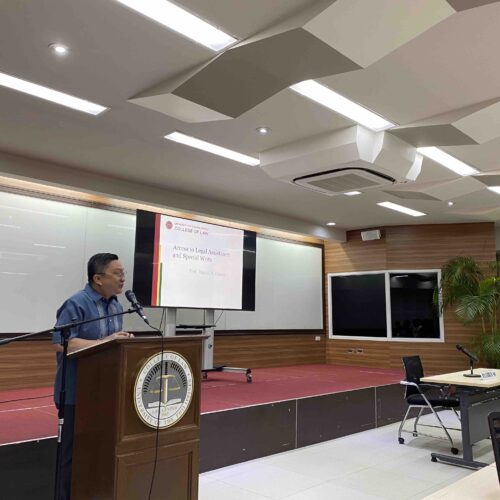
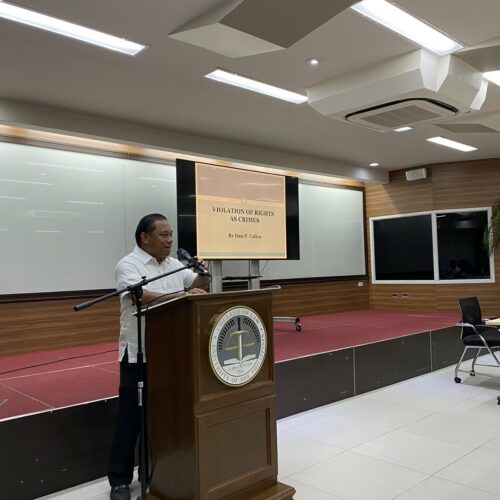
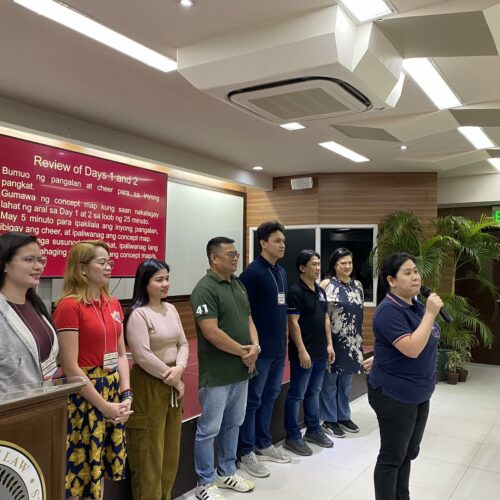
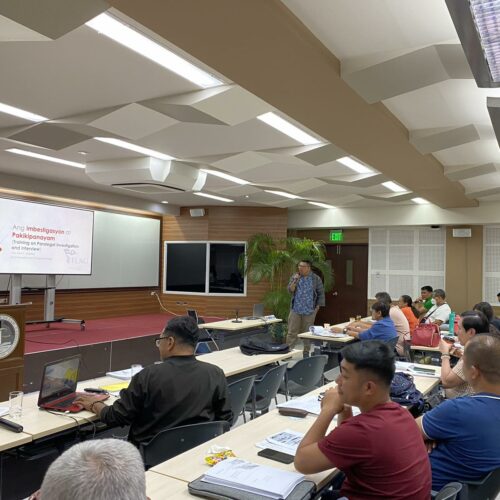
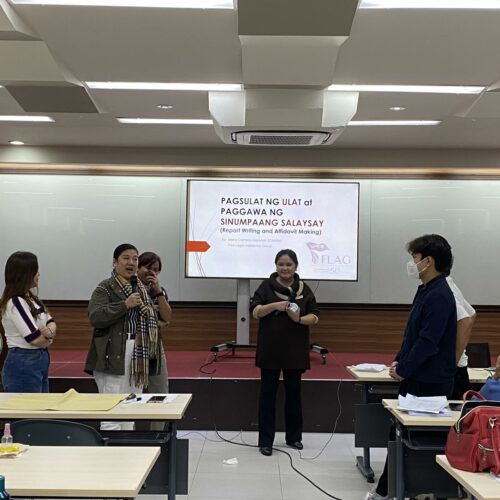
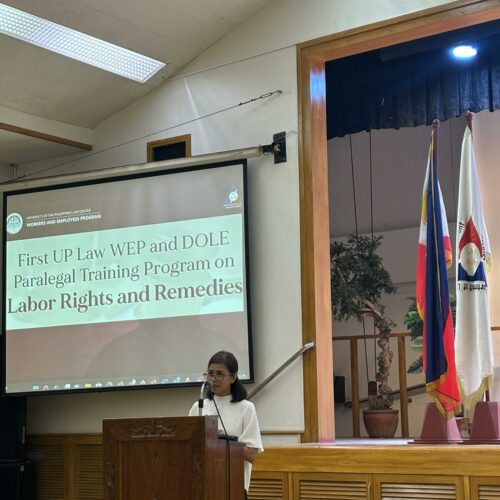
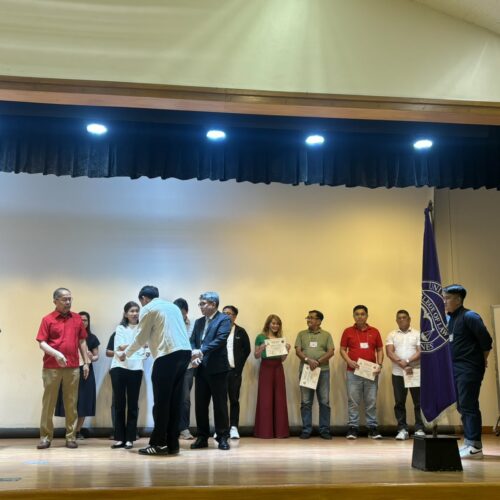






































































































 on the upper right corner to select a video.
on the upper right corner to select a video.